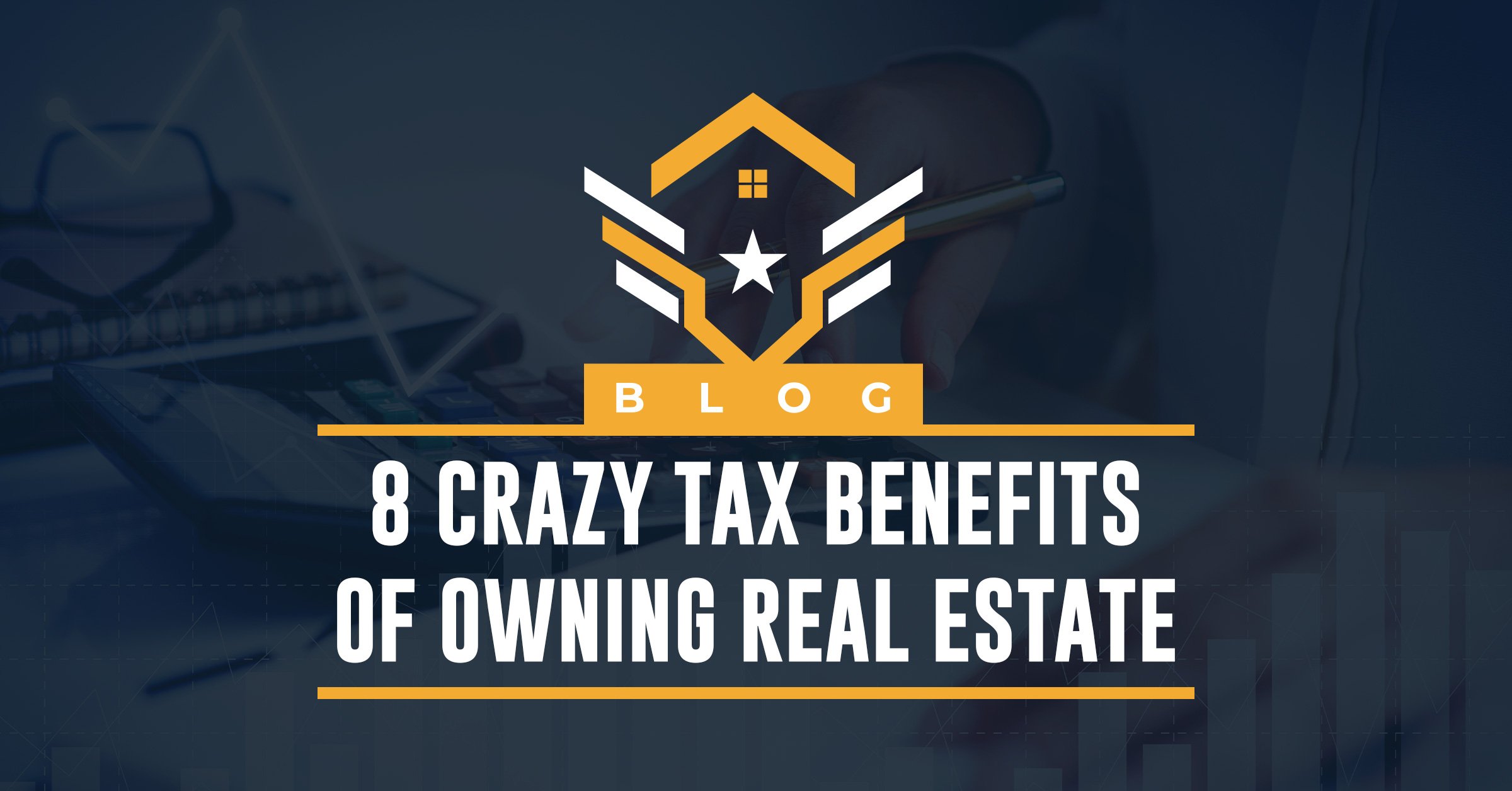
Real Estate Tax Benefits with
Kevin Brenner, ADPI Hero, Capt, USAF / @investorkev
“If you get up early, work hard, and pay your taxes, you will get ahead-if you strike oil.” – J. Paul Getty
Disclaimer:
I am not a certified tax advisor, nor do I aspire to be one. This blog should not be used or be considered professional tax advice. I highly recommend consulting with a tax professional to obtain specific tax advice tailored to your financial goals and aspirations. The below thoughts are of my own opinion and should not be considered legal advice in any way, shape, or form.
Now that we got that out of the way…
Let’s talk taxes! Yay everyone’s favorite subject! Who doesn’t love forking over your hard-earned cash to the government so they can maybe get around to fixing that pothole that’s single-handedly thrown your car’s alignment out of whack?
Well, the truth is, taxes are important. Taxes help fund necessary programs and keep local municipalities alive. They fund public parks, schools, streets, and a whole bunch of other fun stuff that you would probably miss out on if you lived in a tax-free bubble somewhere.
As recently as last year, there has been a major overhaul in the United States tax code, which by the way, is easily the most complicated and convoluted set of tax rules and regulations on the planet. I mean think about it, people have to go to school and study for years just to take not one, but a series of super challenging tests to qualify as Certified Public Accountants (a.k.a. CPA) – which in a nutshell, means that this person can somewhat navigate the thousands of pages of tax code to help normal people like me and you from tearing our hair out on April 15th.
Rather than blindly click through Tax Slayer’s online questionnaire every spring, the savviest of investors consult with their CPA to build a tax strategy that spares them from the brunt of Uncle Sam’s gut punch to the wallet. Now, since this is a real estate blog, let’s see how owning investment properties can save you thousands every year!
The 8 Tax Benefits of Owning Real Estate Investments
1. Depreciation
Somewhere along your quest to absorb as much real estate information as you can, I’m sure you’ve run across the term “depreciation”. Real estate investors sometimes act as if depreciation is the greatest thing since sliced bread. Well, the truth is, sliced bread doesn’t compare to depreciation! In a nutshell, depreciation takes the form of an IRS formula that divides the tax assessor’s value of your property by 27.5 years of “useful life” for residential real estate. That number is then multiplied by the marginal tax rate which determines how much money in tax savings you are allowed to claim. It pretty much accounts for the fact that, similar to your car, the older your property ages, the more the value depreciates.
Wait, I thought real estate appreciates? In most markets this is true. That’s why it’s such a good investment, especially when your tenants are paying all the bills. Unfortunately, the IRS is wise to this trend as well. When you sell your asset, the IRS plugs certain values into a special formula to calculate what is called “depreciation recapture”. Yup, you guessed it: The IRS knows that you made a crap ton of money on your investment and well, that pothole isn’t going to fix itself. They are out for blood. Muah Ha Ha!
2. Mortgage Tax Deductions
This one is pretty straightforward. When tax time rolls around you should get a letter from your mortgage holder, usually a bank, that states how much you’ve spent on the interest associated with your mortgage over the past year. Why do they do this? Because you can deduct that amount from your income tax on your Schedule E. Too much tax talk – don’t worry bring it up to your CPA and they will walk you through the entire process.
3. The 1031 Exchange
The 1031 exchange is arguably the greatest tax benefit for real estate investors! I can (and will) write an entire blog post just on this bennie, but for now, let’s summarize. In short, the 1031 Exchange refers to a section of the tax code that allows real estate investors to defer the capital gains taxes typically associated with the sale of an investment property if they follow a strict set of rules. While I won’t bore you with all of the details here, the long and short of the 1031 Exchange lies within the fact that, if done properly and legally, a savvy real estate investor can build their net worth while deferring a huge chunk of taxes until they die – where their tax bill is then forgiven. There are entire tax specialists who solely focus on 1031 exchanges, so if you have questions I highly recommend looking one up and setting up a consultation.
4. Maintenance & Upkeep Deductions
You can deduct regular maintenance and upkeep from your income to limit your annual tax exposure. That’s why many real estate investors have developed systems to track every receipt related to lawn care, snow removal, HVAC maintenance, garbage collection, etc. No, they aren’t just small paper enthusiasts. They are looking out for their bottom line, especially when Uncle Sam is holding his hand out every April.
5. Cost of Services (Legal, Property Management, etc.)
Your lawyer drawing up paperwork for the LLC that owns your assets. You can deduct that. That 10% monthly PM fee – deductible! Accounting services from the CPA who is doing your taxes? You can deduct that too. It may seem small, but remember that everything adds up. So those little seemingly insignificant bills that cross your desk may one day save you a fist full of cash.
6. Utilities
Must I delve into this? Just know that if you had to put the utilities in your name to cover a few months during let’s say a tenant vacancy or a rehab project – save those bills. You can deduct that!
7. Travel Cost Deductions
This one is commonly overlooked but can easily shave a huge chunk of money off of your reportable income. If you are a local investor, you can deduct the travel expenses if you are traveling to check up on your property. I’m talking gas, car maintenance (wear and tear), oil changes, and a litany of other expenses. I know investors that use apps like TripLog that allow you to track every single mile driven in support of your investment properties. Some investors will buy separate cars that they only use while they are “working” on their investment business. Then they have other cars they use at night or on the weekends. Also, if you are an out-of-state investor, you can deduct the flights down to visit your properties. How about the meals? Yup, deductible. But you have to be diligent and track your receipts. Build a system and stick with it – it will save you come tax time!
8. Property Tax Deductions
Finally, another relatively self-explanatory deduction. You can deduct certain property taxes from your income. Refer to your local tax professional to get all the details on this deduction.
Summary
Taxes can either be your worst enemy or a welcomed mid-April guest. It just depends on if you are prepared to do the work to protect yourself and your investments. This means hiring a CPA who specializes in real estate investments, tracking every receipt and invoice, and making the commitment to educate yourself about state and federal tax regulations. Sounds fun, right? Not really, but if a few hours of your life can save you $10,000 or maybe even $15,000 would you do it? I’m betting so.
The truth is, humans fear what they do not understand. Knowing that fact, you can position yourself to become an expert in something that most people brush off as too complicated or not worth the time. Don’t worry, you will be rewarded handsomely for this effort. Education is power and the key to all future success. I hope this blog helps you realize why owning investment properties is more than just a good idea – it’s the key to building wealth and pursuing financial freedom in America!

Kevin Brenner is an active Real Estate Professional who specializes in small multifamily long-distance BRRRR investments. He currently operates 8 cash-flowing units out of state while serving in the United States Air Force. Find out more about Kevin’s passion for real estate and financial education on Instagram by following @investorkev. You can also shoot him an email at [email protected].








